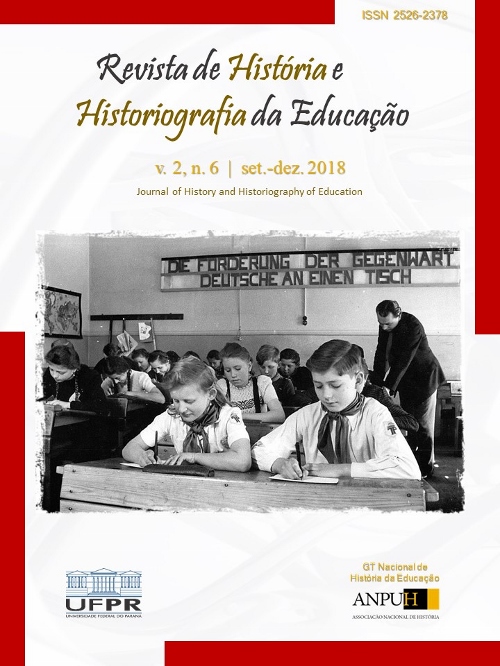A história entre a escola “tradicional” e a escola “nova”: os manuais de didática da CADES / The history between the "tradicional" school and the "new” school: CADES’ textbooks
DOI:
https://doi.org/10.5380/rhhe.v2i6.60995Palavras-chave:
História, Didática da História, Manuais de didática, CADES, Ensino de história / History, Didactics of History, Manuals of didactics, History teachingResumo
Os manuais de didática são fontes privilegiadas para a história das disciplinas escolares. De acordo com Chervel (1990), esses manuais fazem parte de uma farta literatura educacional, que permite analisar as finalidades e objetivos das disciplinares escolares. No Brasil, o Estado sempre desempenhou um papel importante nas políticas de produção, avaliação, publicação, aquisição e distribuição de textos didáticos. Na década de 1950 foi criada a Campanha de Aperfeiçoamento e Difusão do Ensino Secundário (CADES), com objetivo de contribuir para a melhoria da qualidade do ensino secundário por meio da promoção de cursos de aperfeiçoamento oferecidos aos professores. Resultaram desses cursos a publicação de dois manuais de Didática da História. Inserido no conjunto de debates acerca da história das disciplinas escolares, este trabalho teve como objetivo analisar as finalidades e objetivos da Didática da História presentes nos manuais da CADES. Teoricamente, o trabalho foi sustentado em dois campos complementares. De um lado os debates da sociologia do conhecimento. De outro, da história dos livros e das práticas de leitura. Na análise dos manuais, identificamos sua ressonância com a legislação educacional vigente e a apropriação dos referenciais do movimento escolanovista, que inclui autores da Didática Geral e da Psicologia. Além disso, a oposição entre uma escola “tradicional” e uma “escola nova”, responsáveis por definir a função e as finalidades da Didática da História.
* * *
The didactic manuals are privileged sources for the history of the school subjects. According to Chervel (1990), these manuals are part of a large educational literature, which allows us to analyze the aims and objectives of school subjects. In Brazil, the state has always played an important role in the production, evaluation and publication policies, acquisition and distribution of textbooks. In the 1950s the Campaign for Improvement and Diffusion of Secondary Education (CADES) was created with the objective of contributing to the improvement of the quality of secondary education through the promotion of improvement courses offered to teachers. These courses resulted in the publication of two textbooks. Inserted in the set of debates about the history of the school subjects, this work had as objective to analyze the aims and objectives of Didactics of History present in the manuals of CADES. Theoretically, the work was sustained in two complementary fields. On the one hand the debates of the sociology of knowledge. On the other hand the history of books and reading practices. In the analysis of the manuals, we identified its resonance with the current educational legislation and the appropriation of the references of the “new school” movement, which includes authors of General Didactics and Psychology. In addition, the opposition between a "traditional" school and a "new school", responsible for defining the function and purposes of Didactics of History.




